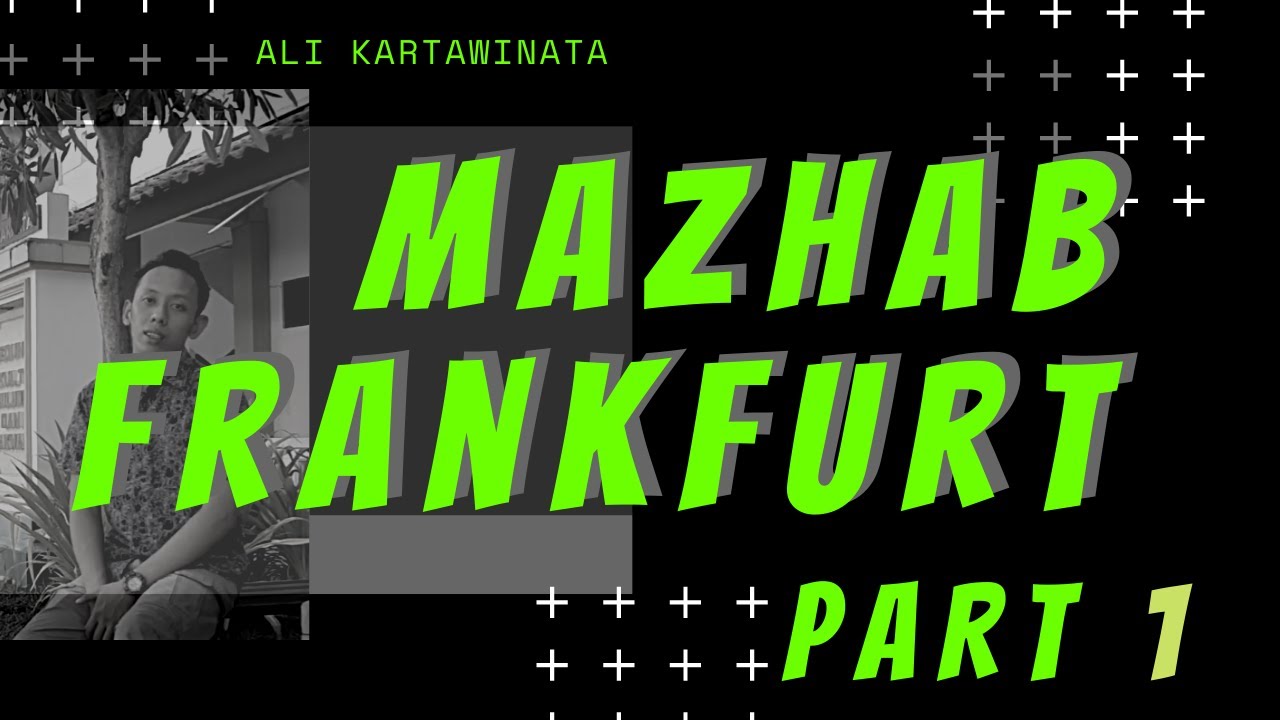Dr. F. Budi Hardiman: "Mazhab Frankfurt dan RAF/ Baader-Meinhof"
Summary
TLDRThis video delves into the Frankfurt School's critical theory, focusing on its departure from orthodox Marxism. It highlights how Frankfurt scholars criticized the economic determinism of traditional Marxist thought, emphasizing the role of the superstructure in shaping social consciousness. The video explores the impact of their ideas on modernity, capitalism, and movements like the New Left and the radical Rote Army Faction. It also discusses their critiques of fascism, imperialism, and the radicalization of student movements, while pointing to their evolving stance on ideological violence.
Takeaways
- 😀 The Frankfurt School emerged as a critical response to orthodox Marxism, which was seen as overly deterministic in its view of economics determining all aspects of society.
- 😀 The key critique of orthodox Marxism by the Frankfurt School was its economic determinism, which stated that economic base shapes everything in society, including ideology, culture, and consciousness.
- 😀 The Frankfurt School argued that the 'superstructure'—things like culture and consciousness—could also influence economic practices, not just the other way around.
- 😀 They were influenced by the works of Marx, Hegel, and Weber, particularly in their ideas about how modernity and rationality shaped human life.
- 😀 The Frankfurt School introduced the concept of 'instrumental rationality', which they believed dominated modern society, focusing on efficiency, control, and technological development.
- 😀 The critical theory developed by the Frankfurt School analyzed how modern industrial capitalism and science were often shaped by instrumental rationality, leading to dehumanization.
- 😀 This instrumental rationality was seen as a major factor in the rise of totalitarian ideologies, such as fascism and communism, which the Frankfurt School critiqued for being rigid and dogmatic.
- 😀 Their ideas influenced radical leftist movements, including the New Left and the Red Army Faction (RAF), who adopted Frankfurt School's critiques of capitalism, imperialism, and fascism.
- 😀 Despite their influence on radical groups, the Frankfurt School distanced itself from violence, arguing that ideological commitment should not lead to radicalization or violence.
- 😀 The Frankfurt School’s critique also resonated with anti-imperialist movements, including those in Latin America and China, which were seen as more progressive alternatives to Western capitalism.
Q & A
What is the core theory proposed by the Frankfurt School?
-The core theory of the Frankfurt School critiques the deterministic view of Orthodox Marxism, particularly the idea that the economic base determines the superstructure and consciousness. They argue that the superstructure can, in turn, influence economic practices.
How did the Frankfurt School criticize Orthodox Marxism?
-The Frankfurt School criticized Orthodox Marxism's economic determinism, which held that social classes (e.g., bourgeois or proletariat) dictated one's consciousness, ideology, and even artistic and religious beliefs.
What is the Frankfurt School's view on the relationship between economics and consciousness?
-The Frankfurt School proposed that consciousness, or the superstructure, can influence economic practices and not merely be a reflection of the economic base as Orthodox Marxism suggested.
Who were some of the intellectual influences on the Frankfurt School?
-The Frankfurt School was influenced by Max Weber's theories, in addition to the ideas of Karl Marx and Georg Wilhelm Friedrich Hegel.
What is the Frankfurt School's stance on rationality?
-The Frankfurt School highlighted the dominance of 'instrumental rationality' in modernity, arguing that this form of rationality is a driving force behind modern science, industrialism, and capitalism.
How did the Frankfurt School view modernity?
-The Frankfurt School viewed modernity as being largely dominated by instrumental rationality, which led to the development of ideologies such as fascism and communism.
What were some political movements inspired by the Frankfurt School?
-The Frankfurt School influenced radical movements such as the New Left and the Rote Armee Fraktion (Red Army Faction), particularly due to its Marxist foundations and its criticism of orthodoxy and fascism.
How did the Frankfurt School's ideas align with or diverge from Marxism?
-While the Frankfurt School retained a Marxist framework, it was critical of Orthodox Marxism's dogmatism, especially in its view of economic determinism and class consciousness.
What was the Frankfurt School's position on violence and radicalism?
-The Frankfurt School distanced itself from radical movements that advocated violence, including student protests, and rejected the idea of ideologizing revolution through violent means.
Why did the Frankfurt School criticize fascism and imperialism?
-The Frankfurt School was staunchly anti-fascist and anti-imperialist, rejecting both the ideologies of fascism and Western imperialism, while expressing support for revolutionary movements in countries like China and Latin America.
Outlines

Cette section est réservée aux utilisateurs payants. Améliorez votre compte pour accéder à cette section.
Améliorer maintenantMindmap

Cette section est réservée aux utilisateurs payants. Améliorez votre compte pour accéder à cette section.
Améliorer maintenantKeywords

Cette section est réservée aux utilisateurs payants. Améliorez votre compte pour accéder à cette section.
Améliorer maintenantHighlights

Cette section est réservée aux utilisateurs payants. Améliorez votre compte pour accéder à cette section.
Améliorer maintenantTranscripts

Cette section est réservée aux utilisateurs payants. Améliorez votre compte pour accéder à cette section.
Améliorer maintenantVoir Plus de Vidéos Connexes

Seri Kuliah Online: (1) Teori Kritik, Latar Belakang Lahirnya Teori Kritik Mazhab Frankfurt

The Frankfurt School: From a Failed Revolution to Critical Theory | Tom Nicholas

Mazhab Frankfurt dan Teori Kritis Part 1 - Ali Kartawinata

Teoría Crítica I Escuela de Frankfurt I Teorías de la Comunicación

¿Qué es la TEORÍA CRÍTICA? Origen histórico, características y autores representativos

Critical Theory, The Frankfurt School, Adorno and Horkheimer, and the Culture Industries Explained
5.0 / 5 (0 votes)
